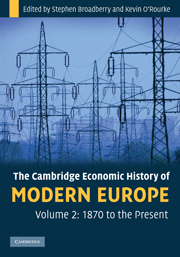Book contents
- Frontmatter
- Contents
- List of figures
- List of tables
- List of contributors
- Foreword
- Introduction to Volume 2
- Part I Before the First World War
- 1 Globalization, 1870–1914
- 2 Aggregate growth, 1870–1914: growing at the production frontier
- 3 Sectoral developments, 1870–1914
- 4 Business cycles, 1870–1914
- 5 Population and living standards, 1870–1914
- Part II The world wars and the interwar period
- Part III From the Second World War to the present
- Bibliography
- Index
4 - Business cycles, 1870–1914
Published online by Cambridge University Press: 05 August 2012
- Frontmatter
- Contents
- List of figures
- List of tables
- List of contributors
- Foreword
- Introduction to Volume 2
- Part I Before the First World War
- 1 Globalization, 1870–1914
- 2 Aggregate growth, 1870–1914: growing at the production frontier
- 3 Sectoral developments, 1870–1914
- 4 Business cycles, 1870–1914
- 5 Population and living standards, 1870–1914
- Part II The world wars and the interwar period
- Part III From the Second World War to the present
- Bibliography
- Index
Summary
Introduction
The following survey concerns itself with the interaction between business cycles and the international economy in the “heyday” of capital flows, trade integration, and global migration before the First World War. Some years ago Alec Ford provided a defining survey of issues pertaining to business cycles in the classical age of the gold standard (Ford 1989). As a result of Ford's work, any discussion of business cycles during the last quarter of the nineteenth century has inevitably focused on the operation of the gold standard, and on the conduct of monetary policy in a gold standard system, or just next to one.
But this perspective is not without confusions and ambiguities. As Ford emphasized, and as subsequent writers have repeatedly rediscovered, the diversity of experiences within the gold standard period (a period which included many individual cases of floating exchange rates) is so large that it is extremely difficult to generalize. The exchange rate regime, trade flows, capital flows, and monetary policies are indeed relevant to the subject matter of “business cycles” before the First World War. But beyond that, generalizations are difficult.
Providing a comprehensive yet balanced survey of issues is a daunting challenge. As an alternative, this chapter provides a simplified guide to critical problems. Readers therefore should not expect to find in the following pages anything like an update of Alec Ford's article. Rather, they will be provided with perspectives, gleaned from the research frontier, on where we think knowledge is heading.
- Type
- Chapter
- Information
- The Cambridge Economic History of Modern Europe , pp. 84 - 107Publisher: Cambridge University PressPrint publication year: 2010
- 3
- Cited by



